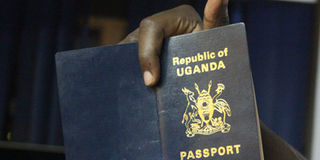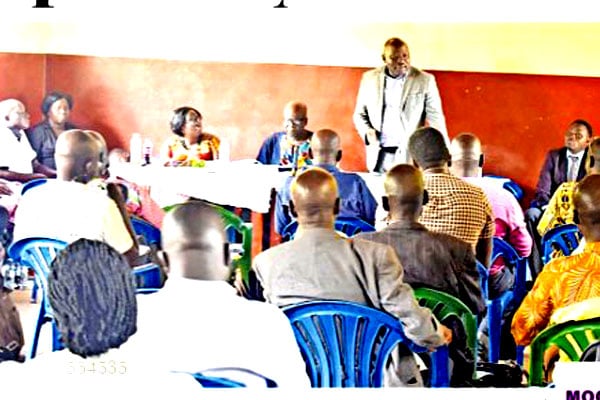Prime
How foreigners get Ugandan passports

If one wants a Ugandan passport, they must appear in person before relevant authorities to avoid issuing them to non citizens. PHOTO BY ABUBAKER LUBOWA
What you need to know:
The process of attaining a Ugandan passport may seem hazardous, especially for foreigners, but with the loopholes in the system, they can get them illegally.
While serving as Uganda’s ambassador to DR Congo in the late 1990s, Jackson Ocana got a partner named Fauzia Beya, a national of the same country, who he came with to Kampala. Ms Beya, also brought other people from Congo.
She neither officially married Ocana, who died a year ago, nor did she apply for Ugandan citizenship. But Ms Beya acquired a Ugandan passport, No. B334881 in 2002, under the name Gukunda Beatrice Ocana, born in Kisoro, Uganda.
Claudine Charla, one of the people who arrived with Ms Beya, changed her name to Claudine Atim. She joined the Acholi tribe and got a Ugandan passport No. BO486128 in 2005 showing that she was born in Gulu District in Lacor Hospital under her new name.
Then, there is a 14-year-old boy, who arrived in Uganda in 2004 named Ismail Benedict Balo. He acquired a Ugandan diplomatic passport in 2005 with No. DA021835. This suggests that he could have been presented as a son of the late Ocana since diplomats’ children below 18 years old were entitled to diplomatic passports.
Prosecuted
This is the centre of the testimony of the main prosecution witness in a case currently before the Gulu Chief Magistrate, Mr Praff Rutakirwah.
Ms Charla a.k.a Atim and Mr Ismail Benedict Balo a.k.a Ocana are charged with illegal possession of Ugandan passports.
They are also jointly charged with Mr George Wirefred Opiro, the assistant commissioner in the Ministry of Education, for conspiracy to illegally possess the same passports.
Prosecution alleges that Mr Opiro, the younger brother of the late Ocana, conspired with the duo on September 11, 2012 during a family meeting at the administrator general’s office over the estate of the late Ocana. He presented two Ugandan passports as identification documents for his co-accused.
According to the Constitution, a citizen must be born in Uganda or have one or both parents or grandparents a member of any of the indigenous communities existing and residing within the borders of the country by February 1926. This is when the last part was added to Uganda.
Although born outside Uganda, one can become a citizen if their parents or grandparents were at the time of that person’s birth a citizen of Uganda by birth. But if a child of not more than five years of age is found in Uganda and his parents are unknown, that child is then presumed to be Ugandan.
This is just like any child under 18 years, who is born of non-Ugandan parents but is adopted by a Ugandan, becomes a citizen upon registration.
The only other alternative for one to assume Ugandan citizenship is through applying to authorities and getting naturalised.
No evidence was presented to show that the accused fulfilled any of the above requirements for acquiring Ugandan citizenship.
How then did they come to possess Ugandan passports, which right is an exclusive preserve of Ugandans?
Ms Beya is wanted by police in connection with the passports.
She is said to have brought in more DR Congo nationals apart from the two currently before court in Kampala, who could also have got Ugandan passports. She is also said to have acquired a diplomatic one.
Mr Opiro, who acknowledges that the accused came from DR Congo, says he cannot explain how they came to possess Ugandan passports since they were living under the care of his late brother by the time they acquired the passports.
It is not clear whether the late Ocana helped his partner and the people she is said to have brought along to illegally acquire Ugandan passports or they did it on their own accord, riding on their association with a senior foreign service official.
What is clear, however, is that this case is not an isolated incident.
The Ugandan passport has for long been subjected to abuse. An official in the Ministry of Internal Affairs, who preferred anonymity because he is not the official spokesperson, said it is not unusual, even in the past, for senior foreign Service officials to acquire Ugandan passports for girlfriends they got in countries they are posted.
Mr Wanume Kibedi, the chairperson of the Uganda Immigration and Citizenship Board, agrees. Mr Kibedi, who was hired in 2010 to “clear the mess” in the sector, says there were indeed “historical” problems in the passports office.
“Serious investigations are going on,” Mr Kibedi says, adding that some officers from the passports office were recently questioned by the police. Another senior officer is currently being interdicted over suspected malpractice, Mr Kibedi says.
Months ago, the Passport Control Office said some 200 diplomatic passports had gone missing from their strong room.
Mr Kibedi says a passport is a vital document, for, among other functions, “entitles someone to protection by his country wherever in the world they may be.”
He says changes have been made and now whoever wants a passport must appear personally at the Passports Office unlike in the past when agents would procure passports on behalf of their clients.
In case of doubt about an applicant’s particulars, Mr Kibedi says the problematic case is referred to him.
But not everyone is enthusiastic as Mr Kibedi. Mr Milton Muwuma, the chairperson of the parliamentary Committee on Defence and Internal Affairs, which oversees passports, says: “We are not even close as a country to plugging the holes in the Passports Office.”
Mr Muwuma says the absence of a national identity card to differentiate a Ugandan means that people freely oscillate between Uganda and neighbouring countries due to porous borders, making it difficult to determine who is entitled to a passport and who is not.
He also says that many people in neigbouring countries speak languages similar to those spoken in Uganda and share many other things in common, making it hard to clearly differentiate them from Ugandans.
According to Mr Muwuma, in the absence of a national identity card, the office accepts all manner of identification documents from applicants, including voter cards, birth certificates, school certificates, residential ID, baptism cards and employee cards.
Unfortunately, none of these is immune to forgery. The problem is compounded by lack of a vital registration system to capture vital events like birth and death despite the law providing for it.
Mr Muwuma says there is a virtual breakdown of the lower local government system. Elections for lower local councils have not taken place in more than a decade and courts have already declared the current local councils illegal.
Local councils ineffective
According to Mr Muwuma, a less expensive way of capturing vital statistics like births, marriages and deaths would be through the local council system, which unfortunately is “effectively dead.”
The MP says many of those who had been elected to local councils have since died and their positions have been assumed by other people.
In some places, there have been wrangles among people claiming to be the legitimate local council officials.
He says it is easy for people seeking endorsement from local leaders to bribe their way through. Others, he adds, forge local council stamps and claim to live in places where they have never been. Local council endorsement is a requirement for the passport office to process a passport.
Moreover, Mr Muwuma says the immigration department lacks adequate manpower, technology and expertise to deal with illegal immigrants.
These challenges are significant and probably a good starting point would be to first understand the extent of the problem. But not even Mr Kibedi will hazard a guess on how many non-Ugandans hold Ugandan passports illegally.
He has only one fallback position – to wait and hope that the forged passports will expire quickly and the illegal holders will not be in position to renew them.
-------------------------
Requirements for naturalisation as a citizen
Resident. He or she has resided in Uganda throughout the period of 12 months immediately preceding the date of the application;
That during the seven years immediately preceding that period of 12 months he or she has resided in Uganda for periods amounting in the aggregate to not less than five years.
He or she has an adequate knowledge of a prescribed vernacular language or of the English language
He or she is of good character
He or she would be a suitable citizen of Uganda; and He or she intends, if naturalised, to continue to reside permanently in Uganda.
(Second Schedule Uganda Citizenship Act 1962) Requirements for obtaining a passport by Ugandans. Forms A and B, signed by LCs at different levels and the Resident District Commissioner
Cover letter from employer/school/ parents /guardian or person well known to applicant.
Copy and original applicant’s identification documents for instance voters card, birth certificate, school certificate, residential ID, baptism card, employer’s card.
Coloured passport size photos taken against a white background. Recommendation from citizen of good repute and proof of profession.




